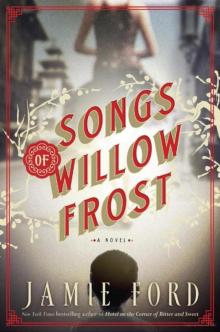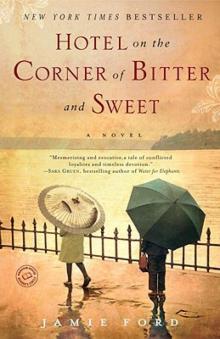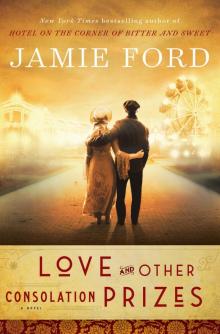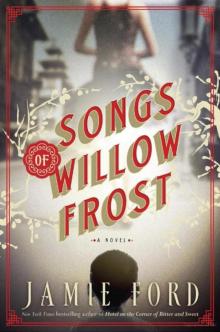- Home
- Jamie Ford
Love and Other Consolation Prizes Page 13
Love and Other Consolation Prizes Read online
Page 13
As he opened the door he felt a wave of condescension even before he took in the sight of Mrs. Irvine, flanked by a dozen hard-nosed matrons of the Mothers of Virtue. Her scowl seemed to soften when she saw him. The other ladies were trying to pass out handbills to strangers on the street, most of whom ignored their attempts. A few of the women carried painted signs condemning Madam Flora and the Tenderloin.
“It’s a miracle!” Mrs. Irvine said as she regarded Ernest and then cast her eyes toward the gray, overcast sky, the starless night. “You’re alone! This is your chance, Ernest. We ladies have important work to do, but you can leave, get thee behind me, and when we’re done here I’ll take you back to Holy Word, away from this…this…” She spat the word at Ernest’s feet: “this nightmare.”
Ernest paused, breathless. He thought about the conversation he’d had upstairs, with Jewel. He remembered his placid, servile existence under Mrs. Irvine’s care, where he’d undoubtedly be for the next year if he were to return. He looked at the signs the women hoisted that condemned white slavery, and he remembered how easily they’d put him on the block to be raffled off. He wondered what the difference was. Then he thought about the Tenderloin, about Fahn, and Maisie, about earning real money of his own and about eventually learning to drive a motorcar. He heard the piano calling him. He’d briefly wondered why Jewel didn’t leave, and now he had to ask himself the same question.
“What are you waiting for?” Mrs. Irvine asked before Ernest could compose himself enough to speak. “I’m sorry that you ended up here, but if you care a whit for your immortal soul, you should run far and fast, and do it now. Better to live out your days as a beggar in a poorhouse than as a young lord in a house such as this.”
Ernest felt a twinge of guilt, not for being at the Tenderloin but for feeling so excited at the prospect of being a young lord. “It’s good to see you, Mrs. Irvine,” he stammered. “But I have a job to do. And, I’m sorry, you’re not on the guest list.”
Mrs. Irvine frowned and held up one of the invitations. The envelope had been opened, and she regarded the elegant piece of stationery as though it pained her just to be in its presence. He wondered how she’d come to have it in her possession. “We came to stop this abomination. And we brought help. We’re going to shut this place down eventually—mind my words, young man—and if you’re here when that happens, you’ll get smeared with the same tar brush.” She cocked her hip as though that was the end of the argument. Then she grabbed a pair of uniformed police officers by the arms as the other ladies practically pushed them up the front steps.
One of the grim-faced policemen tipped his hat at Ernest and shook his head slowly, almost imperceptibly, then turned around to address the crowd.
“Now you ladies go on and head home to your husbands. Let us take care of this ugly piece of business,” the officer said in a calm, commanding tone. “This isn’t the kind of neighborhood you ought to be in after dark. Rest assured, I’ll make certain those accountable get what they deserve.”
A police wagon motored up to the curb, and three more officers stepped out and redirected pedestrians on the sidewalk away from the area in front of the Tenderloin.
Satisfied, the women clutched one another and sang a hymn as they held their heads high, marching off into a gathering crowd of gawkers and looky-loos. Mrs. Irvine yelled back from somewhere in the street, “Remember what I said, Ernest! Remember what I said! It’s not too late to come back!”
As Ernest watched, the police officers walked past him through the door and into the parlor. The lead officer paused, then yelled, “What’s a guy gotta do to get invited to this kind of party?” The reply was a rousing cheer from the patrons inside.
Ernest walked back in as Miss Amber was handing glasses of port to each of the officers, and the Gibson girls sidled up to each man in uniform.
Madam Flora appeared next to Ernest. “It’s so good to have you with us, dear. Welcome to the sporting life.”
He watched as she placed a cup in Councilman Gill’s hand and he offered a toast to the hardest-working police department in the Northwest. Then a few of the officers were led up the grand staircase as the bidding continued.
Ernest felt an arm around his waist and knew that it was Fahn. She’d doffed her apron and kitchen bonnet but still smelled like rosemary and sage.
“I heard that lady talking to you, young Ernest,” Fahn said. “Madam Flora did too. Maybe that woman—Mrs. Irvine—is right. Maybe you should go now while you still can, before you start to enjoy your new life. We’ve all had a chance to leave this business and no one ever does. Why do you think that is?”
Ernest looked up at the crystal chandelier, the velvet wallpaper, the lacy elegance, the wealth in the room, the power—but the sensation that overwhelmed him was more than prestige and opulence. He sensed Fahn’s warmth, the comfort of her touch; he felt charmed and alive, as they stood hip to hip. It was in sharp contrast to Mrs. Irvine, who seemed dull, and cold, who found offense in everything she saw, except her own decadence. Maybe that’s why the dour old woman never seemed to smile. Ernest thought too about his immortal soul, as Mrs. Irvine had described it—the same one he’d learned about in Sunday school, where the children were taught to do good deeds unto others. And yet, those same kids had wrapped up rocks and bricks as gifts and given them to him on his last birthday. Ernest had opened them up quietly, one after another, as everyone laughed. When the teacher arrived, she merely chastised him for making a mess.
As a ward of the state, Ernest had never had a girl as a friend, let alone an actual girlfriend. At Dow’s Landing the boys all pretended that they hated the girls, and relentlessly teased anyone who acted contrary. And at Holy Word, the second-class kids were rarely allowed at dances or ice cream socials. But as Fahn leaned into him he felt at peace, unjudged. He felt free. He wasn’t sure what their relationship was becoming, but whatever the strange connection was, he was caught up in the blatant, unrepentant honesty of the Tenderloin—as naked and bare as the girls upstairs. He let himself drift away on the riptide of new emotions that came with this place on a daily basis. He felt tangled to the point of casual surrender. That’s when he thought of Mrs. Irvine’s words and knew that it was already too late.
“Five hundred dollars!” one of the men shouted.
The women cheered. The men heckled one another, boasted.
“Councilman Gill, are you going to let that kind of offer go unchallenged?” Madam Flora dared as she took the cigar from his mouth and began smoking it, blowing smoke rings across the table. “You have a reputation to uphold. I don’t think you want people thinking you’ve become some kind of teetotaling Quaker, do you?”
The councilman smiled and yelled, “Here’s to an open city, with open minds, and open wallets. Seven hundred dollars.”
“Seven hundred and fifty,” another shouted as he finished his drink and set his glass down with a sharp retort. “And open breeches!”
The drunken men roared.
“Eight hundred for this lovely girl,” an older, clean-cut businessman said. “But for a night of my sterling companionship, she should be paying me!”
The men laughed, and more drinks were poured.
Ernest looked at Jewel, who seemed to be eating up the extravagant attention by so many rich and powerful patrons. Her cheeks, which earlier had been streaked with tears, now seemed to be positively glowing as she regarded the bidders. Some might have passed as handsome, ten or twenty years ago. Ernest thought about what Fahn had said about dogs admiring trees.
Ernest lost track of the sum after it passed one thousand dollars and the roaring and cheering all blended into a deafening hurricane of ribald commerce. The music, the bidding, the laughing, the shouting, the lavish fervor was intoxicating. But it was sickening, confounding as well. Being sold at a high price didn’t change the fact that a person was being sold like a head of cattle. His heart was numb when the auction finally died down and the last toast was offered. The ladies a
ll sang “Good Evening, Caroline” as Jewel and the lucky winner ascended the stairs and waved goodbye, as though setting sail aboard the Mauretania.
Ernest chewed his lip and shifted uncomfortably at the thought of what they’d be doing hence. Jewel was the youngest of the Gibson girls, which left only him, an assortment of maids, and presumably Maisie, and Fahn, as the residents of the Tenderloin whose virtues remained somewhat intact. As he stared at the grand carpeted staircase and listened to the music, he might have daydreamed for hours if Miss Amber hadn’t poked him in the ribs. She handed him a heavy silver bucket with a bottle of wine, overflowing with chipped ice.
“What are you lollygagging about for? Follow them upstairs, and do it quick. And watch your step, that bottle of cuvée is a Ruinart ’82, the best in the house—probably worth more than you’ll make in two lifetimes.”
Ernest looked at the bottle and did what he was told. He trailed behind the couple, setting the bucket on a table just inside the door to their suite. The winning bidder thanked him happily and then shooed Ernest off with a ten-dollar bill as he unfastened his black suspenders and loosened his white tie.
Jewel stared back at Ernest with quiet eyes. She seemed neither happy nor sad, scared perhaps, just a little, but more resigned than anything else. She didn’t even blink as the cork popped and careened off the ceiling. Instead, she merely mouthed the words “Thank you” to Ernest as he closed the door behind him.
—
WHEN ERNEST LOOKED at the clock it read 2:37 A.M. He’d been busy all night, decanting wine, shining shoes, removing lint from the coats of guests, and fetching cabs as the party slowly wound down to the calm of intimate conversation and a gentle waltz rendered by Professor True. The piano man had loosened his tie and seemed to be playing in his sleep, eyes closed, bent over the ivory keys of his baby grand even as his fingers danced back and forth like puppets on strings.
The policemen had left hours earlier, but not before the girls showered them with wet, lipstick-stained goodbyes and Madam Flora slipped each officer a handful of folding money. She could afford it, as Jewel had brought in over a thousand dollars from a porcine businessman with a cleft in his double chin. If Jewel had objections to her suitor, she’d kept them masterfully hidden. Ernest thought of how she’d cooed and addressed him as though he were the man of her dreams—Prince Charming in a waistcoat one size too small.
“Thirteen hundred dollars was the winning bid. Not by a particularly handsome man, but at least it was a handsome sum,” Fahn had whispered as she collected empty wineglasses.
Ernest had never even seen a hundred-dollar bill, let alone held one. He felt the ten-dollar bill in his pocket, more money than he’d ever possessed at one time. At the Tenderloin, the cash and the stringent rules of polite society ebbed and flowed as freely as the whiskey and the bottles of Bordeaux.
“What’s the most anyone’s ever paid for one of these nights?” he asked.
“Well—if you can believe it, they say there was a man named Louis J. Turnbull who once bid five thousand dollars.”
“For who?” Ernest asked, wide-eyed. His jaw hung open, slightly. That was a king’s ransom. Ernest couldn’t comprehend that much money. He was making twenty cents an hour, plus room and board.
“You don’t want to know.” Fahn rolled her eyes.
“I do, actually,” Ernest said.
“For the one person who isn’t up for sale anymore,” Fahn said. “I know you heard about how Madam Flora retired. Well, some men didn’t think that certain restrictions applied to them, especially Louis Turnbull. He used to spend entire weeks with Flora. I don’t know if he was heartbroken when she stopped working, or just upset that there was something in the world his money couldn’t buy. Over the years he tried charming her with lavish gifts from around the world, but Amber put a stop to that.”
Ernest tried to imagine that kind of money.
“It’s a story for another time—rather ugly. Hey, I’m done in a few minutes. Give me a half hour to freshen up and get out of my uniform, then come up to the empty guest room on the fourth floor. I’m ready to collect on what you owe me.”
Ernest’s palms began to sweat, and his heart and stomach seemed to change places. He remembered her long kiss in the street—which had sent lightning bolts from the top of his head to the soles of his feet. That moment had filled his daydreams and had kept him awake at night.
He’d been haunted by her words: now…you owe me.
But Ernest lingered downstairs and pretended to be busy. Sure, he liked her—he definitely cared for her and was infatuated in a way that he’d thoroughly enjoyed. Yet he wasn’t certain about paying back whatever debt she was intending to collect.
A man’s raspy voice said, “You can’t avoid her forever, you know.”
Ernest looked over and saw Professor True peeking at him with one eye open. Then the old man smiled, shook his head, and kept playing with his eyes closed as he said, “Might as well go on up. She’s not gonna bite you or nothing, not that one for sure.”
“It’s not the biting I’m worried about,” Ernest said. “It’s everything else.”
Professor True chuckled and shook his head. “Oh, what I wouldn’t give to be your age all over again. Then again, back in those days, I was playing on street corners in Kansas City for pennies.”
Ernest wondered, “How long have you been working here?”
“Longer than you’ve been alive, son,” the man said. “Let’s just say that I came with the building. And I’ll be here, writing, playing, singing, as long as my fingers will allow. But you’re just stalling now, aren’t you?”
Ernest sighed in agreement and untied his apron.
“There you go,” Professor True said. “As a wise man with a funny collar and pointy shoes said, Once more unto the breach, dear friends, once more; Or close up that wall—something like that. You know what I mean…”
Ernest didn’t, but the quote sounded like a verse he’d read in school. Probably Shakespeare. And as he took the long walk up the stairs and along the carpet-lined hallway, he heard the now-familiar giggles and laughter from behind closed doors, and the odd rhythm and helpless moans of men and women in the throes of pleasure or anguish—sometimes it was hard to discern which. He passed some of the upstairs girls as they were freshening up with new, painted-on smiles, or winding down. Some even kissed him on the cheek and bid him good night.
He brushed the hair from his eyes, cleared his throat, and gently knocked on the guest room door. Words from another play the older kids had once put on at the children’s home came rushing back—Lord, what fools these mortals be!
Ernest knocked again, and the door pushed open, slightly. Cautiously, he peeked into the room. One small paraffin candle was burning on a corner table. The window was wide open, and a cool breeze blew the curtains back like the sails of a ship with a broken mast, lazily drifting to nowhere in particular.
He called out Fahn’s name. Then he heard whispers.
“Out here, young Ernest, on the fire escape.”
Ernest smelled tobacco on the cool draft and heard another, familiar voice in addition to Fahn’s. He closed the door behind him, crept across the room, and held the curtains aside as he climbed through the open window and out into the early-morning air, which felt unseasonably warm.
“Well, well, well,” the other girl’s voice called out.
Ernest flinched and then felt bad for recoiling when he saw Maisie—especially as she smiled up at him for the first time ever, and waved benignly.
“Geez, I’m not gonna hit you, Ernest,” she said. “Relax, willya.”
Both girls had removed their dresses and were sitting on the grating of the fire escape in their long slips, leaning on one of the crossbars, dangling their stocking-covered toes over the edge of the platform, which hovered fifty feet above the alley and the rooftops of the nearby buildings. The girls scooted over in opposite directions, inviting him to sit between them. He double-knotted the
laces on his shoes, lest one come loose and tumble to the street below, then sat between them. The metal of the fire escape felt cold and hard, but he didn’t care because just to sit—to get off his weary feet—was a welcome relief.
From their perch he could see the flags atop the courthouse and the Alaska Building; he could even make out the shapes of the frescoed walruses, tusks and all, which adorned the crown of the Arctic Club. But the loveliest spectacle was that of the rippling waters of Puget Sound, deckled with lights from piers, boats, cruise ships, and freighters of every kind. He’d never seen a view from a place so high up. Then he smelled coal-fired furnaces, steam plants, and Maisie’s cigarette. He looked on, wide-eyed, as she took a deep drag and then offered it to him. He stared at the tip, glowing reddish orange in the breeze. Mrs. Irvine had dozens of names for the vice: little white slavers, dope sticks, devil’s toothpicks, the list went on. Before he could react, Fahn reached over, took the cigarette, put it to her lips, and inhaled as a moth flitted overhead.
She exhaled slowly through her nostrils, and wispy tendrils of gray smoke looped over her lips and swirled into the air. She whispered, “If you’ve never been kissed before, then I’m positive that you’ve never tried a Sweet Caporal.” She put the cigarette to his lips. “Here—don’t try to swallow the smoke, just inhale nice and gentle-like, then slowly let it all out.” Her words were lullaby soft.
Ernest didn’t want to, but one little puff seemed simple enough. So he inhaled—then coughed, lurched forward, wheezed, and gagged so much that Fahn nearly dropped the cigarette as he flailed and batted her hand away. His eyes watered and his throat burned while Maisie laughed—no, she practically roared—clutching her stomach and kicking her feet. She patted him on the back, which only made his coughing worse.

 Songs of Willow Frost
Songs of Willow Frost Hotel on the Corner of Bitter and Sweet
Hotel on the Corner of Bitter and Sweet Love and Other Consolation Prizes
Love and Other Consolation Prizes Songs of Willow Frost: A Novel
Songs of Willow Frost: A Novel